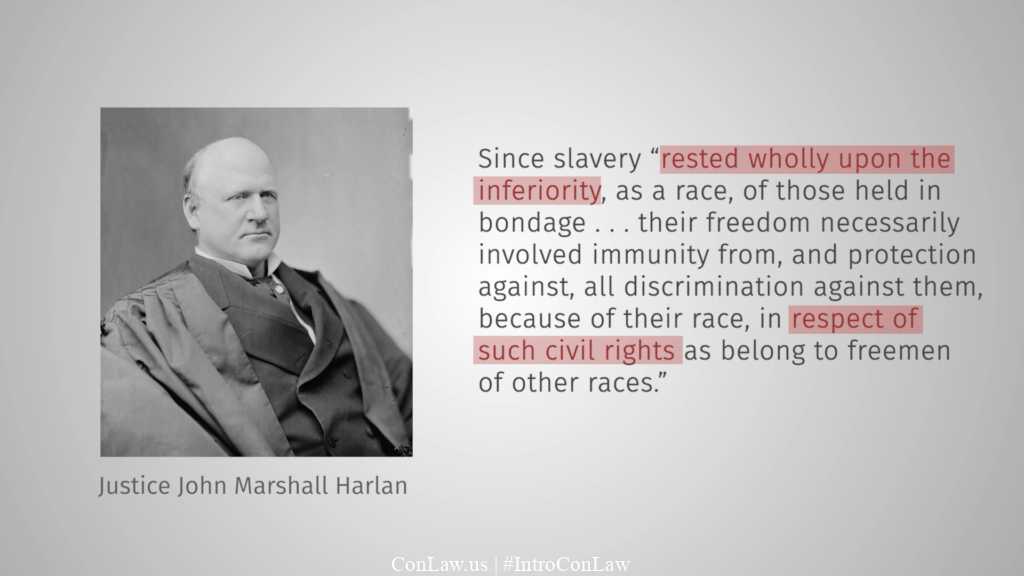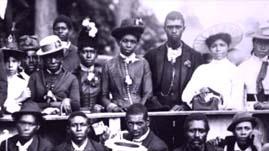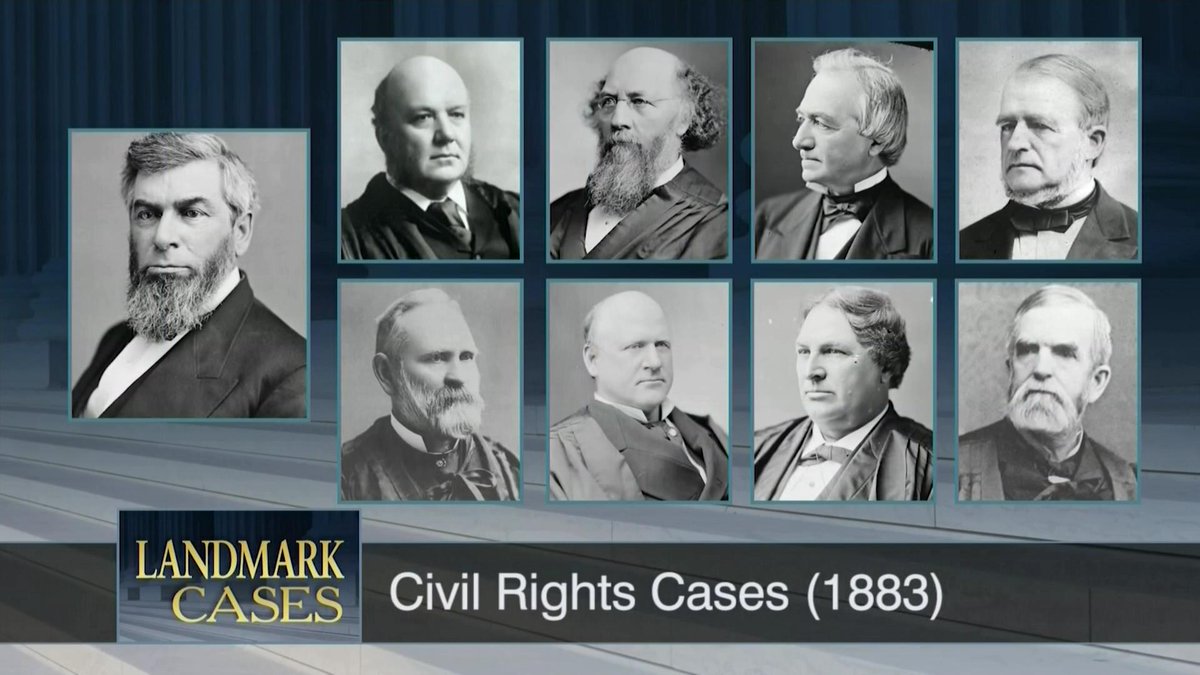To avoid this cancel and sign in. Several individuals of color were denied admission to theaters cabs cars and inns based on their race.
The Mirror Of Racial Tyranny In The Civil Rights Cases Marquette University Law School Faculty Blog
In five separate cases a black person was.
/GettyImages-640463175-3aa8f569201d465695b447b978a392b2.jpg)
Civil rights case of 1883. The Civil Rights Act of 1875 affirmed the equality of all persons in the enjoyment of transportation facilities in hotels and inns and in theaters and places of public amusement. Videos you watch may be added to the TVs watch history and influence TV recommendations. The Robinson case was submitted on the briefs at the last term on the 9th day of arch 1883.
Since 2010 we have offered professional writing services to clients all over the world. About Press Copyright Contact us Creators Advertise Developers Terms Privacy Policy Safety How YouTube works Test new features Press Copyright Contact us Creators. Add one or use Full Width layout.
Race remained a contentious issue in America after the Civil War and racial discrimination a fact of life for minorities. The Civil Rights Case Frederick Douglass October 22 1883 Frederick Douglass 1879. African-American citizens protested their exclusion from a hotel dining room in Topeka Kansas.
A number of cases involving application of the federal law were collected in this case and presented to the Supreme Court during the term 1882-1883. Supreme Court held that the Civil Rights Act of 1875 was unconstitutional. Civil Rights Cases 1883.
Civil Rights Cases Of 1883. Decided 15 October 1883. In the Civil Rights Cases of 1883 the Supreme Court took the rare route of deciding five separate.
The Court ruled that under the Equal Protection Clause of the Fourteenth Amendment Congress could prohibit only discrimination by state actors not private individuals. And from a car set aside for ladies on a. The Civil Rights Cases.
From the better seats of a San Francisco theater. Civil Rights Act of 1875. From the opera in New York City.
Charles Sumner of Massachusetts sponsored the Civil Rights Act of 1875 which prohibited racial. Memphis Charleston RR. In the Civil Rights Cases of 1883 the Court made it impossible to enforce the Civil Rights Act of 1875 which sought to provide all persons within the jurisdiction of the United States with the full and equal enjoyment of public accommodations.
Civil Rights Cases five legal cases that the US. This template supports the sidebars widgets. 3 1883 in which the US.
Required minimum 6 pages max 12 make it at least 8. Five cases condensed into one centralized issue for review United States v. Though privately owned these businesses were like public utilities exercising public functions for the benefit of the public and thus subject to public regulation.
These individuals claimed that this violates their under a federal law passed in 1875 that entitles all individuals in the United States the right to. About the Civil Rights Cases of 1883 Background. Supreme Court consolidated because of their similarity into a single ruling on October 15 1883 in which the court declared the Civil Rights Act of 1875 to be unconstitutional and thus spurred Jim Crow laws that codified the previously private informal and local practice of racial segregation in the United States.
During the post-Civil War Reconstruction Period between 1866 and 1877 Congress passed several civil rights. 835 1883 Brief Fact Summary. Public domain from the National Archives.
There were no appearances and no briefs filed for the defendants. Supreme Court of the United States. Guided questions are in the document.
The XIVth Amendment is prohibitory upon the States only and the legislation authorized to be. The Civil Rights Cases of 1883 combined five different cases that revolved around the 1875 Civil Rights Act which guaranteed all persons the enjoyment of transportation facilities in hotels and inns and in theaters and places of public amusement regardless of race color or previous condition of servitude. The Stanley Ryan Nichols and Singleton cases were submitted together by the solicitor general at the last term of court on the 7th day of November 1882.
Details of the Cases. The 1st and 2d sections of the Civil Rights Act passed March 1st 1876 are unconstitutional enactments as applied to the several States not being authorized either by the XIIIth or XIVth Amendments of the Constitution.
 An Introduction To Constitutional Law The Civil Rights Cases
An Introduction To Constitutional Law The Civil Rights Cases
 The Supreme Court The Civil Rights Cases Pbs Learningmedia
The Supreme Court The Civil Rights Cases Pbs Learningmedia
 Cspan On Twitter Monday Landmarkcases Civil Rights Cases 1883 9pm Et On C Span Https T Co Dok6w8jahg Scotus
Cspan On Twitter Monday Landmarkcases Civil Rights Cases 1883 9pm Et On C Span Https T Co Dok6w8jahg Scotus
 The Rise And Fall Of Jim Crow Jim Crow Stories Civil Rights Act Of 1875 Overturned Pbs
The Rise And Fall Of Jim Crow Jim Crow Stories Civil Rights Act Of 1875 Overturned Pbs
 Civil Rights Cases Of 1883 Youtube
Civil Rights Cases Of 1883 Youtube
 Civil Rights Cases 1883 U S Conlawpedia
Civil Rights Cases 1883 U S Conlawpedia
/cra-58b6de495f9b586046478d35.jpg) About The Us Civil Rights Act Of 1875
About The Us Civil Rights Act Of 1875
 The Civil Rights Act Of 1875 And The Civil Rights Cases Of 1883 C Span Org
The Civil Rights Act Of 1875 And The Civil Rights Cases Of 1883 C Span Org
 Rolling Back Civil Rights Us House Of Representatives History Art Archives
Rolling Back Civil Rights Us House Of Representatives History Art Archives
Popular Posts
-
Most of the agricultural societywas largely supported by the feudal system social hierarchy. The Feudal System was introduced to England fol...
-
He ruled from 5 April 1462 to 27 October 1505 he was known as Ivan the Great and was a Grand Prince of Moscow. 29 October 1603 Moscow Russia...
-
Indian National Congress 1885. N the official name for Congress3 Collins English Dictionary Complete and Unabridged 12th Edition 2014 Harper...
Featured Post
eyes but cannot see verse
83 Bible Verses about Have Eyes But Do Not See . “Son of man, you dwell in the midst of a rebellious house, who have eyes to see, but ...

ads
